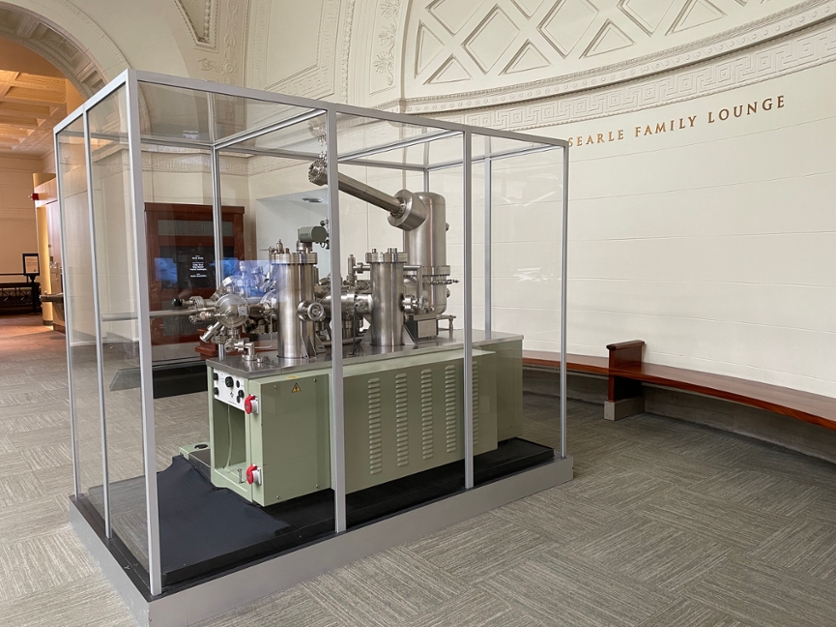K-12 & Informal Science
Summer Research Experience for Teachers (RET)
June 23 – August 15, 2025
Applications for Summer 2025 are no longer being accepted
Chicago Public School teachers: please note that we are aware of the overlap of CPS scheduling and the RET program start date. This will not negatively impact your ability to participate in the program.
The Center provides a Research Experience for Teachers (RET) program each summer. Middle-school, high-school, and community-college teachers are eligible to apply. Participating teachers engage in research, develop a network of scientific colleagues, learn scientific and technological developments, and discover ways to transfer this knowledge to their classroom. Teachers are matched up with a center faculty based on research interests.
Program participants conduct hands-on, cutting-edge research for eight weeks. At the end of the program, the teachers are asked to summarize their findings in a technical final report and to develop a short curriculum project based on their research that can be adapted to their own classrooms. In addition, they also have the opportunity to give a 15-minute oral presentation at the closing symposium. Other program activities include a field trip to a national lab or an industrial research site and seminars by Northwestern faculty.
For an overview of Center research, please visit our research section. A list of some previous projects is also available.
Our RET program participants receive an $8,500 stipend. A travel supplement and/or on-campus housing are available for participants outside of the immediate Chicagoland area. The RET program is approved for participants to earn Illinois State Board of Education (ISBE) Professional Development credits.
To be eligible for the program, the teacher must be a U.S. citizen or permanent resident, have at least a bachelor’s degree in science or engineering, and be able to conduct on-site research during the entire eight weeks of the program.
For further information, contact mrc-ret@northwestern.edu, 847-467-0470.

Prof. Lincoln Lauhon with Summer 2022 RET Participants
Materials World Modules (MWM)
The Materials World Modules (MWM) are hands-on, inquiry and design-based units for middle and high school students that have been used by over 100,000 students in schools across 49 states. Based on materials science and nanotechnology principles, this interdisciplinary approach engages students, adds relevance to traditional curriculum, and has been shown to improve science knowledge for all students.
National Science (AAAS, NSES) and Math (NCTM) standards – as well as selected state Science and Math standards – have been mapped to the activities and design project(s) of most MWM and all National Center for Learning and Teaching in Nanoscale Science and Engineering (NCLT) modules. Nationwide field tests demonstrate an average student achievement gain of 2-3 standard deviations after participating in a single two week MWM module.
Examples of interdisciplinary modules include Composites, Ceramics, Concrete, Biosensors, Biodegradable Materials, Smart Sensors, Polymers, Food Packaging, Sports Materials, Solar Cells, Nanotechnology, and Drug Delivery.
The MWM Program was introduced to the State of Chihuahua, Mexico through a series of teacher workshops highlighting a number of modules translated into the Spanish language. Since then, NU-MRSEC has collaborated with the MWM program to help MWM-Mexico to expand its impact around the whole of Mexico. Available Spanish modules include Sports, Concrete, Composites, Biosensors, Biodegradables, Introduction to Nanotechnology.
MWM has also been working with schools in Qatar and China.
For more details, please visit the MWM site.
Museum Partnerships
Chicago Museum of Science and Industry
The NU-MRSEC has partnered with the Chicago Museum of Science and Industry to create a new temporary exhibit focused on materials science and society. The goal of the exhibit is to showcase the tandem relationship between human mastery of materials and the advancement of human civilization. The display features the latest in materials design and technology with applications in space exploration and nanotechnology. The exhibit features displays of a variety of material samples that will engage the audience through the senses of sight and touch while leveraging the leadership and technical resources of Northwestern.
Two videos from the exhibit:
- Why do rare earth magnets need to be replaced?
- Diamond vs. Graphite — Different Structures, Different Uses
Field Museum
The NU-MRSEC partnered with the Chicago Field Museum of Natural History to bring the latest iteration of the Materials Science exhibit to the Searle Family Lounge at the Field Museum. The Materials Science exhibit was conceived in collaboration with the Museum of Science and Industry (MSI) and is designed for the general public to highlight how materials science and engineering enables understanding, innovation, and design that shape society. Originally installed at MSI and subsequently moved to the Chicago O’Hare airport and then the Harold Washington Library in downtown Chicago, the centerpiece of the exhibit is an Atom Probe Field-Ion Microscope that was previously housed in the NU-MRSEC shared facilities. The Field Museum exhibition opened in April 2021, and features a new bilingual gallery, in both English and Spanish, highlighting the recent application of atom probe tomography to the analysis of meteorite samples by Dr. Philipp Heck of the Field Museum.

ETOPiA
The Engineering Transdisciplinary Outreach Project in the Arts (ETOPiA) uses performance arts in the McCormick School of Engineering and Applied Sciences to inspire a cross-disciplinary dialogue about the role of science and technology in society. This annual event highlights the pursuit and application of knowledge by individuals whose historical and personal circumstances span from tragic to epic.
ETOPiA strives to generate awareness among students of all ages and disciplines about the interdependence of the different fields of study, and the services, responsibilities, and obligations of engineers and scientists in today’s society.
ETOPiA was founded by MRSEC Researcher Professor Matthew Grayson, and receives support from the NU-MRSEC.
